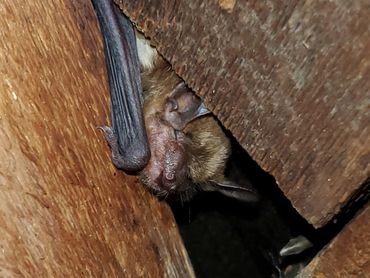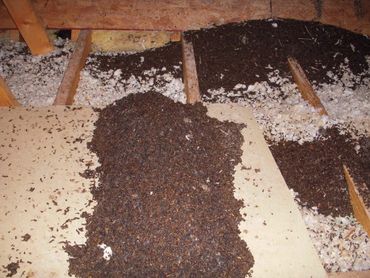Connect with Our Wildlife Experts Today! (904) 999-9241

Bat Proofing
Bats are Nocturnal & Resourceful creatures that often find their way into homes through small openings in search of Roosting Spots. They can cause Significant Structural Damage & pose Health Hazards if not Addressed Promptly.
***(BAT Maternity Season April 15- August 15th)***
Understanding & Preventing Bat Damage
Protect your home & property from bat damage with expert solutions. Our comprehensive bat management services include inspection, exclusion, & prevention strategies tailored to your needs. Learn how to safeguard your home & prevent future infestations with our humane methods.
How to Identify Bat Activity
- Guano (Bat Droppings): One of the most noticeable signs of a bat infestation is the presence of guano. Bat droppings are small, dark, & pellet-shaped. They often accumulate in piles below roosting spots, such as attic floors or window sills. Guano can also have a strong, musty odor.
- Stains & Grease Marks: Bats can leave dark, greasy stains around entry points as they squeeze in & out. These marks are caused by the oils & dirt on their fur & are often found around vents, eaves, & gaps in the roof or walls.
- Noises: You might hear bats in your home, particularly at dusk & dawn when they are most active. Common sounds include scratching, squeaking, & fluttering noises, typically coming from attics, walls, or chimneys.
- Sightings: Seeing bats flying around your property at dusk or dawn can indicate an infestation, especially if you notice them entering or exiting a specific part of your home.
- Strong Odor: A strong ammonia-like odor can develop due to the accumulation of guano & urine. This smell can permeate living spaces & become quite noticeable over time.
- Droppings Stuck to Walls: In some cases, bat droppings can be found stuck to walls, indicating a large number of bats roosting in an area.
- Presence of Bats: Physically seeing bats inside your home, especially in areas like the attic or basement, is a clear indication of an infestation.
Potential Damages & Health Hazards
Potential Damages & Health Hazards
Potential Damages & Health Hazards

Bats can cause significant damage & pose health hazards when they infest homes or buildings. Their droppings, known as guano, accumulate over time, leading to structural damage & creating foul odors. Guano also fosters the growth of histoplasmosis-causing fungus, posing serious health risks to humans. Bats can introduce parasites like mites & ticks into your home, further exacerbating health concerns.
Signs of Infestation
Potential Damages & Health Hazards
Potential Damages & Health Hazards

Recognizing the signs of a bat infestation early is crucial for preventing damage & health risks. Common indicators include the presence of bat droppings (guano) around entry points, hearing scratching or squeaking noises at dusk & dawn, & noticing stains around entry points due to bat oils. You may also spot bats flying in & out of your home during twilight hours. If you notice any of these signs, contact us today!
Identifying Bat Activity






Preventive Measures:
- Professional Assistance: If you suspect a bat infestation, it’s crucial to contact a professional wildlife control service. Professionals can safely & humanely exclude bats, clean & sanitize affected areas, & provide long-term solutions to prevent re-infestation.
- Inspect Your Home: Regularly inspect your home for potential entry points, such as gaps, cracks, & holes in the roof, walls, & eaves. Bats can enter through very small openings, so seal any gaps larger than a quarter-inch.
- Maintain Your Property: Keep your property well-maintained by trimming overhanging branches, securing vents & chimneys with screens, & repairing any damaged siding or roofing.
- Reduce Attractants: Bats are attracted to insects, so reducing the insect population around your home can help deter bats. Consider using yellow outdoor lights, which are less attractive to insects.
Bat Proofing Your Home
At Wildlife PRO-TECTION, We Specialize in Humane Bat Prevention Services Designed to Safeguard Your Home Against Wildlife Intrusions:
- Inspection: Our team conducts a thorough inspection to identify potential wildlife entry points—vulnerable areas on your home that bats are/could exploit—& implement preventive measures.
- Sealing Entry Points: We meticulously identify & address openings or gaps where bats could enter your home. This includes gaps in roofs, vents, chimneys, & foundations.
- Installing Barriers: We strategically install wildlife barriers designed to prevent bats from re-entering your home once they’ve been excluded. These barriers are both effective & discreet, seamlessly blending with your home’s architecture.
- Sanitization: we use live enzymes to break down organic matter & eliminate odors at the source. These enzymes work by digesting the bacteria & organic residues left by bat waste, ensuring thorough
decontamination & providing a deeper & more lasting clean than
traditional cleaning products.
- Preventing Future Infestations: Our comprehensive approach not only secures your home against current bat activity but also ensures long-term protection against future invasions.
- Expertise & Peace of Mind: With our deep understanding of bat behavior & proven prevention techniques, you can trust that your home will remain secure & free from bat intrusions.
Contact us today for Expert Bat Proofing & Prevention
Did you Know?

Diverse Species Northeast Florida is home to a diverse range of bat species, including the Brazilian free-tailed bat, the evening bat, & the Southeastern myotis. These bats play a crucial role in the ecosystem by controlling insect populations, with each bat consuming thousands of insects, such as mosquitoes.

Important Pollinators
Some bat species in Northeast Florida contribute to pollination. They feed on nectar from flowers, transferring pollen from one blossom to another. This activity is vital for the reproduction of certain plants & contributes to the health of local ecosystems.

Roosting Habits Bats often roost in a variety of locations, including caves, trees, & structures like attics & barns. They seek out places that offer safety & stable temperatures. Understanding these roosting habits is key to identifying & managing potential infestations in homes & buildings.
Frequently Asked Questions About Bats
Please reach us at info@wildlifepro-tection.com
if you cannot find an answer to your question.
Bats seek shelter in homes & buildings because these structures provide a safe, warm, & dark environment for roosting. Attics, walls, & chimneys are particularly attractive to bats as they offer protection from predators & the elements.
While bats themselves are not aggressive & rarely bite humans, they can pose health risks. Bats can carry rabies, a serious viral disease, & their droppings (guano) can harbor fungi that cause histoplasmosis, a respiratory illness. It's important to avoid direct contact with bats & their droppings.
If you find a bat inside your home, remain calm & avoid direct contact. Close off the room to prevent the bat from flying into other areas & open a window to allow it to escape. If the bat does not leave on its own, contact a professional Wildlife Management service.
While bats themselves do not cause structural damage, their droppings can accumulate & cause staining, odor, & potential health hazards. Large infestations can also lead to insulation damage & increased risk of mold growth due to moisture from their urine & droppings.
The best time to use preventative measures on bats is during late summer or early fall when young bats are old enough to leave the roost. Avoid Bat Prevention during the maternity season (May to August) to prevent separating mothers from their pups. Consult with a professional for the optimal timing in your area.
Contact Us Today!
Get in Touch for Professional Bat Control
If you suspect there's bats in your home or need assistance with prevention, contact WILDLIFE PRO-TECTION today. We offer effective bat control services to protect your home & ensure peace of mind.
Phone: (904) 999-9241
Email: info@wildlifepro-tection.com
Open today | 07:00 am – 10:00 pm |

Protect Your Home from Bat Intrusions!


This website uses cookies.
We use cookies to analyze website traffic and optimize your website experience. By accepting our use of cookies, your data will be aggregated with all other user data.